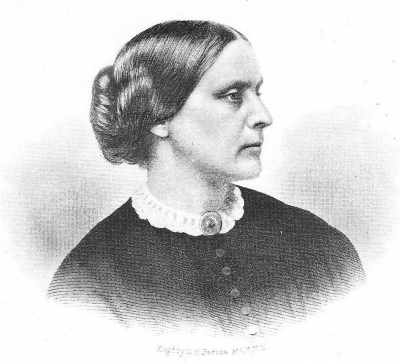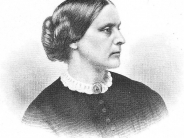Silencing Women: Susan B. Anthony and Suffrage in 1865 Leavenworth
By Bernadette Cahill
Four months after the Civil War ended, when controversy raged about the rights of freed slaves, Susan B. Anthony spoke about civil rights in a grove here in Leavenworth.[1] At the time, Congress was already discussing a Fourteenth Constitutional Amendment to tackle the legal impact of the Thirteenth, which Anthony and her friend Elizabeth Cady Stanton had instigated through a mammoth petition they organized in 1863 and 1864.
In the grove in Leavenworth early that August, Anthony spoke about extending the vote to freedmen and free black men. But local Republicans banned her from speaking about such civil rights for women, for in the 1865 United States, women did not count.
Anthony had been staying here since that January 31, when she came to help during her sister-in-law’s pregnancy. At the time, Anthony’s brother Daniel owned the Leavenworth Bulletin. Now an editor in the family business, Anthony complained she could not report on the rights of black people or women, for her brother did not want controversy. Nevertheless, she organized black refugees flooding into the state into an Equal Rights League.
Leavenworth Republicans banned Anthony from talking about women’s rights after a speech she made July 4 in Ottumwa – about 100 miles to the southwest. Speaking primarily about enfranchising black men, she ended:
When I speak of the inalienable rights of the negro, I do not forget that these belong equally to woman. Though the government shall be reconstructed on … universal manhood suffrage, it yet will not be a true republic. Still, one-half of the people will be in subjection to the other half, and the time will surely come when the whole question will have to be reopened and an accounting made with this other subject class. There will have to be virtually another reconstruction, based on the duty of the national government to guarantee to every citizen the right of self-protection, and this right, for woman as for man, is vested in the ballot.
Anthony spoke so strongly for women’s rights because that May, Wendell Phillips, the most incendiary of the abolitionists, had declared:
I want to have another amendment passed which shall read thus: no State shall at any time make a distinction of civil privileges between the children of parents living on or born on her soil, either of race, condition or color… I hope someday to be bold enough to add "sex." However … we must take up but one question at a time and this hour belongs exclusively to the negro.
“This is the Negro’s hour” became the war-cry of post-war abolitionists and official Republican policy, and the men deliberately ignored the women, cut them out of the debate and tried to silence them, as Republicans did successfully here.
Anthony was not caving, however. Stanton had warned her about the pro-male and anti-woman political sentiment back east. That August she learned the new amendment would include freedmen – and the word “male” to determine the right to vote. The word’s first inclusion in the United States Constitution, when it defined citizens as male, would exclude women from civil rights.
Anguished by this betrayal, soon after her speech in Leavenworth Anthony was heading east, paying her way home in a speaking tour for the National Anti Slavery Standard newspaper by advocating black male suffrage only.
It would be the last time she would talk of the rights of men without the rights of women: that December, Anthony, and Stanton launched a campaign to keep the word “male” out of the post-war Amendments. It would include a bitter fight in Kansas in 1867 to enfranchise black men and all women.
By 1870, their courageous but small, underfinanced, minority campaign pitted against the mighty Republicans and male abolitionists, had failed. It would take women until 1920 and more than 500 separate campaigns to win what the Fourteenth and Fifteenth Amendments gave former slaves and free black men within five years of Appomattox, ensuring that only men had a say in government.
[1]Ida Husted Harper, The Life and Work of Susan B. Anthony, (Indianapolis & Kansas City: Bowen-Merrill Company, 1899,) I, 220-1;





